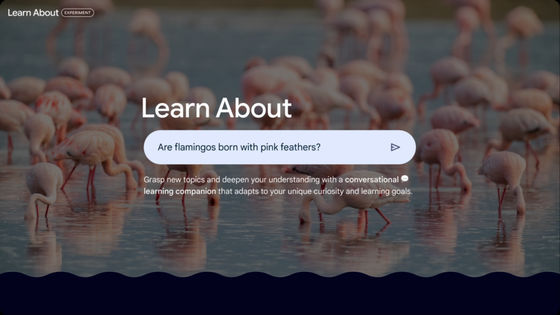Google announces 'LearnLM,' an AI model to evolve Google Search, YouTube, and other services into a form more suitable for educational learning

At its annual developer conference,
How Google's LearnLM generative AI models support teachers and learners
https://blog.google/outreach-initiatives/education/google-learnlm-gemini-generative-ai/

Introducing LearnLM: our new family of models based on Gemini and fine-tuned for learning. LearnLM applies educational research to make our products — like Search, Gemini and YouTube — more personal, active and engaging for learners. #GoogleIO pic.twitter.com/oqPD1iOV6O
— Google (@Google) May 14, 2024
LearnLM is an AI model developed based on Gemini and informed by educational research. LearnLM is tailored to the way people learn, and is part of an effort across Google DeepMind, Google Research, and product teams to make learning experiences more engaging, personal, and useful.
As we develop LearnLM, we work with educators and experts to incorporate the following principles into our AI models and the products that use them:
Encourage active learning: Timely feedback encourages practice and engagement.
Manage cognitive load: Present relevant, well-structured information in multiple modalities.
Adapts to the learner: Dynamically adapts to their goals and needs based on relevant learning materials.
Stimulate curiosity: Stimulate engagement and provide motivation throughout the learning process.
Develop metacognition: Plan, monitor and help learners reflect on their progress.
Google is deploying LearnLM to power learning experiences across products like Google Search, YouTube and Gemini to help people learn and understand more, rather than just providing answers:
◆Google Search
In Google Search, AI Overview summarizes search results for you, letting you adjust the format that's most helpful to you (such as keeping it original or simplifying it) to help you better understand complex topics.

◆Android
On Android,
Circle to Search now makes for a great study buddy 📝 You can circle complex physics problems on your phone or tablet to get step-by-step instructions to learn how to solve. #GoogleIO pic.twitter.com/nFFW36BwWo
— Google (@Google) May 14, 2024
◆Gemini
Gemini, Google's chatbot, will soon be able to use Gems, custom versions of Gemini that act as experts on any topic. One of the pre-made Gems, the Learning coach, helps you build knowledge by providing step-by-step learning guidance along with helpful practice activities like quizzes and games. Gemini's learning coach will be released in the coming months, and Gemini Advanced will allow you to further customize Gems to fit your unique learning preferences.
The new Learning coach Gem uses LearnLM to provide step-by-step study guidance, helping you build understanding instead of just giving you an answer. It will launch in Gemini in the coming months. #GoogleIO pic.twitter.com/cjCQX9oRDO
— Google (@Google) May 14, 2024
◆YouTube
YouTube uses conversational AI tools to allow users to metaphorically 'raise their hand' while watching academic videos to ask clarifying questions, get helpful explanations, and take quizzes on what they've learned. This will also work for longer educational videos like lectures and seminars, thanks to the Gemini model's long context feature. These features are already rolling out to some Android users in the US.
In addition to LearnLM and its existing products, Google is also building new tools and experiences to extend learning.
One such tool is Illuminate, a new tool that breaks down research papers into short audio conversations. In just a few minutes, Illuminate can generate an audio clip with two AI-generated conversational audio clips that can extract key insights from complex papers.
Using long-context to make knowledge accessible - YouTube
Additionally, Learn About is a new experimental experience exploring how information can be transformed into understanding by integrating high-quality content, learning science and chat experiences. Asking questions in Learn About helps students progress through a topic at their own pace through photos, videos, web pages and activities, and allows them to upload files and notes along the way and ask complex questions.

Related Posts:







